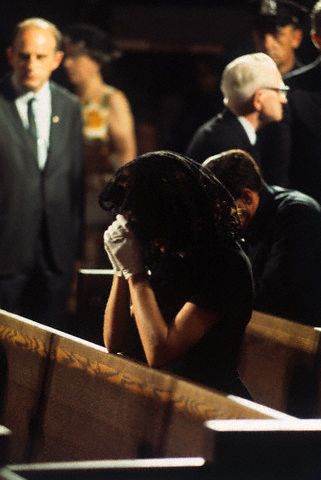 I remember some of the Protestant churches my parents would take me to when I was a child on furlough in the United States (they were missionaries in Japan) were filled with women with veiled heads. That was long ago, of course. Well, maybe not so long ago: some of you may remember pictures of Jacqueline Kennedy coming out of church after Mass with her husband, J.F.K., and their two children. Still today, however, if you darken the doorway of a church where the Traditional Latin Mass is celebrated, you will find yourself in a similar world -- similarly 'strange' by contemporary standards. One feels immediately plunged deep into history and into a world that is distant from cell phones, Reality TV, consumerism, and the 'McDonaldization' of American culture.
I remember some of the Protestant churches my parents would take me to when I was a child on furlough in the United States (they were missionaries in Japan) were filled with women with veiled heads. That was long ago, of course. Well, maybe not so long ago: some of you may remember pictures of Jacqueline Kennedy coming out of church after Mass with her husband, J.F.K., and their two children. Still today, however, if you darken the doorway of a church where the Traditional Latin Mass is celebrated, you will find yourself in a similar world -- similarly 'strange' by contemporary standards. One feels immediately plunged deep into history and into a world that is distant from cell phones, Reality TV, consumerism, and the 'McDonaldization' of American culture.The practice of women covering their heads in church is rooted in ancient Israel, attested by St. Paul (1 Cor. 11:3-16), and was absolutely universal from apostolic times to the 1960s. Canon #1262 in the 1917 Code of Canon Law strictly insisted upon it, and this prescription was in force until it was dropped, mysteriously and without explanation or directive from the Vatican, from the 1983 Code of Canon Law.
The controversy over whether this constitutes abrogation or whether long standing tradition continues to be binding, as I'm inclined to believe, is a heated one. But this is not my chief interest here. Rather, my interest here is in the question of the fittingness of a woman covering her head as a sign of reverence during worship. There is a whole nest of issues involved here. As St. Paul suggests, the signification of a head covering involved a good bit more than this in his day. I'm admitting that significations can change over time. Yet I'm insisting that a covered head or an uncovered head signifies something. What does it signify? There are cultural variables here, obviously. But the variables are not as vast as one might think initially. Most importantly, there is the question of continuity vs. rupture in our own Catholic tradition, as well as the relationship of the Latin, western Catholic tradition vis-a-vis the globalization of Catholicism in a world where there may be some need for sensitivity to what differences, if any, exist in cultural significations that may bear on this issue in non-western cultures. If you run a few Google searches on this issue, you will see that it is anything but a sleepy issue. What think ye?

1 comment:
See archived comments from this post at: http://pertinaciouspages.blogspot.com/2010/08/comments-on-on-hermeneutics-of.html
Post a Comment